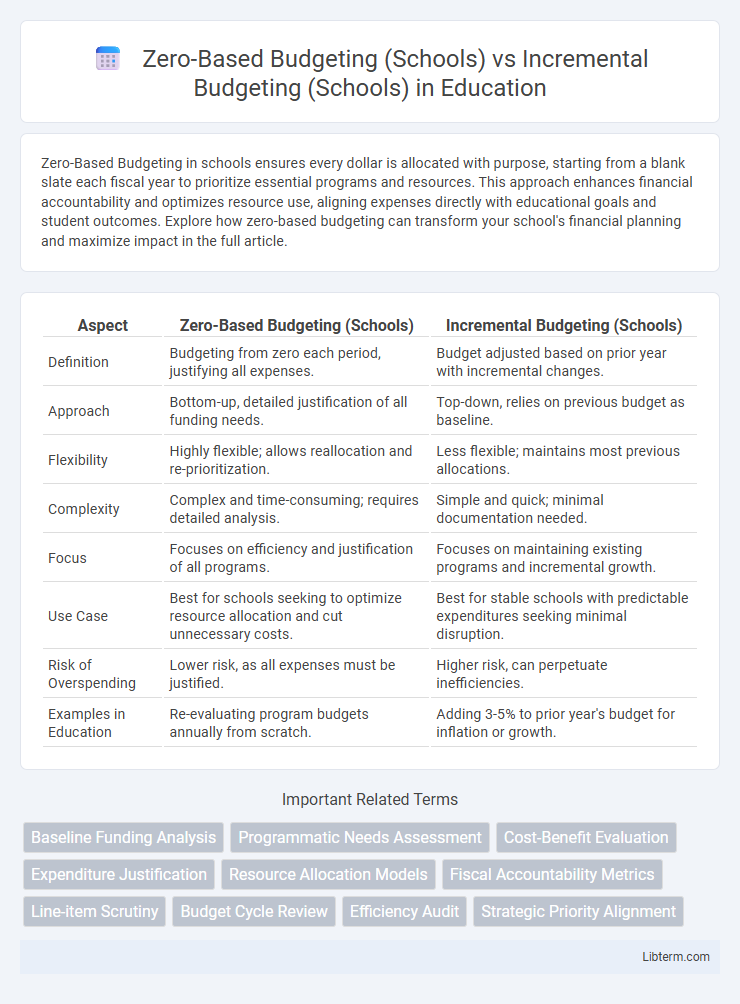Zero-Based Budgeting in schools ensures every dollar is allocated with purpose, starting from a blank slate each fiscal year to prioritize essential programs and resources. This approach enhances financial accountability and optimizes resource use, aligning expenses directly with educational goals and student outcomes. Explore how zero-based budgeting can transform your school's financial planning and maximize impact in the full article.
Table of Comparison
| Aspect | Zero-Based Budgeting (Schools) | Incremental Budgeting (Schools) |
|---|---|---|
| Definition | Budgeting from zero each period, justifying all expenses. | Budget adjusted based on prior year with incremental changes. |
| Approach | Bottom-up, detailed justification of all funding needs. | Top-down, relies on previous budget as baseline. |
| Flexibility | Highly flexible; allows reallocation and re-prioritization. | Less flexible; maintains most previous allocations. |
| Complexity | Complex and time-consuming; requires detailed analysis. | Simple and quick; minimal documentation needed. |
| Focus | Focuses on efficiency and justification of all programs. | Focuses on maintaining existing programs and incremental growth. |
| Use Case | Best for schools seeking to optimize resource allocation and cut unnecessary costs. | Best for stable schools with predictable expenditures seeking minimal disruption. |
| Risk of Overspending | Lower risk, as all expenses must be justified. | Higher risk, can perpetuate inefficiencies. |
| Examples in Education | Re-evaluating program budgets annually from scratch. | Adding 3-5% to prior year's budget for inflation or growth. |
Introduction to School Budgeting Models
School budgeting models primarily include Zero-Based Budgeting (ZBB) and Incremental Budgeting, each offering distinct approaches to financial planning. Zero-Based Budgeting requires schools to justify all expenses from scratch, promoting thorough resource allocation aligned with current educational priorities. Incremental Budgeting adjusts previous budgets by adding or subtracting amounts, providing a simpler method but potentially perpetuating outdated expenditures.
Overview of Zero-Based Budgeting in Schools
Zero-Based Budgeting (ZBB) in schools requires each department to justify all expenses from scratch, promoting efficient resource allocation by prioritizing educational outcomes over historical spending patterns. This method contrasts with Incremental Budgeting, which adjusts previous budgets slightly, often perpetuating inefficiencies and limiting innovation in school funding. Implementing ZBB encourages transparent decision-making, aligns budgets with specific academic goals, and can lead to cost savings that directly benefit student learning environments.
Defining Incremental Budgeting for Schools
Incremental budgeting for schools involves adjusting the previous year's budget by a set percentage to account for changes in expenses or revenues, making it a straightforward and stable approach. This method emphasizes continuity, preserving existing funding levels while allowing for modest increases or decreases based on historical allocations. It simplifies financial planning but may overlook evolving educational needs or inefficiencies, as it often prioritizes incremental adjustments over comprehensive re-evaluation.
Key Differences: Zero-Based vs Incremental Budgeting
Zero-Based Budgeting (ZBB) in schools requires justifying every expense from zero, ensuring resource allocation aligns closely with current educational priorities and eliminating unnecessary costs. Incremental Budgeting builds upon the previous year's budget, adjusting allocations incrementally, which can perpetuate past inefficiencies but simplifies the budgeting process. ZBB promotes strategic resource management and cost-effectiveness, while Incremental Budgeting emphasizes stability and ease of administration in school financial planning.
Pros and Cons of Zero-Based Budgeting in Education
Zero-Based Budgeting (ZBB) in schools offers precise allocation of resources by requiring each expense to be justified from scratch, promoting efficient use of funds and eliminating unnecessary expenditures. However, ZBB can be time-consuming and complex to implement, requiring significant administrative effort and staff training. While it encourages accountability and alignment with educational goals, its intensive process may divert attention from teaching and learning activities.
Advantages and Limitations of Incremental Budgeting
Incremental budgeting in schools offers advantages such as simplicity, stability, and ease of implementation by using previous budgets as a baseline for incremental adjustments, which saves time and reduces the need for extensive data analysis. However, its limitations include perpetuating outdated spending patterns, discouraging innovation, and overlooking shifting priorities or inefficiencies, potentially leading to resource misallocation and budgetary rigidity. This method suits schools with stable funding but may hinder responsiveness to changing educational needs or strategic goals.
Impact on Resource Allocation in Schools
Zero-Based Budgeting in schools ensures every expense is justified annually, leading to more strategic and efficient resource allocation by eliminating unnecessary or outdated expenditures. Incremental Budgeting, relying on previous years' budgets with slight adjustments, often perpetuates existing spending patterns, which can result in inefficient use of resources and missed opportunities for prioritizing emerging educational needs. Schools using Zero-Based Budgeting may experience improved alignment of funds with current instructional goals and student outcomes, enhancing overall resource effectiveness.
Implementation Challenges in School Budgeting
Zero-Based Budgeting (ZBB) in schools demands thorough justification for every expense, making implementation time-consuming and resource-intensive due to the need for detailed cost analysis and staff training. Incremental Budgeting faces challenges in addressing outdated allocations, fostering inefficiencies, and limiting flexibility by relying heavily on previous budgets without in-depth review. Both approaches require overcoming resistance to change among school administrators and ensuring alignment with educational priorities and regulatory requirements.
Which Budgeting Approach Suits Your School?
Zero-Based Budgeting in schools requires justifying every expense from scratch, promoting efficient use of resources and aligning spending directly with educational priorities and outcomes. Incremental Budgeting, based on previous years' budgets with incremental adjustments, offers simplicity and stability but may perpetuate inefficiencies and limit innovation. Schools prioritizing strategic resource allocation and cost control benefit from Zero-Based Budgeting, while those valuing budget predictability and ease of implementation might prefer Incremental Budgeting.
Conclusion: Choosing the Right Budgeting Model for Schools
Zero-Based Budgeting in schools promotes resource optimization by requiring justification for all expenditures, fostering transparency and efficiency. Incremental Budgeting offers simplicity and stability, making it easier to manage incremental changes based on previous budgets. Schools should select a budgeting model aligned with their financial goals, administrative capacity, and need for adaptive resource allocation.
Zero-Based Budgeting (Schools) Infographic

 libterm.com
libterm.com